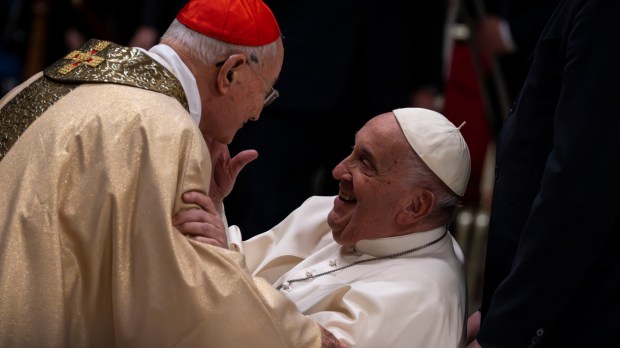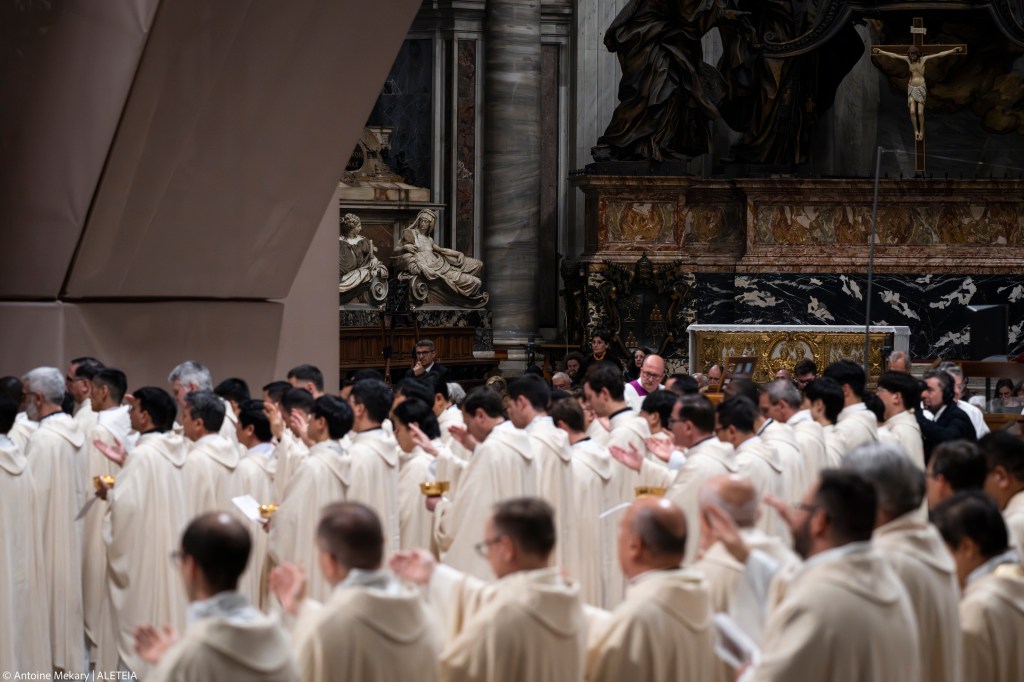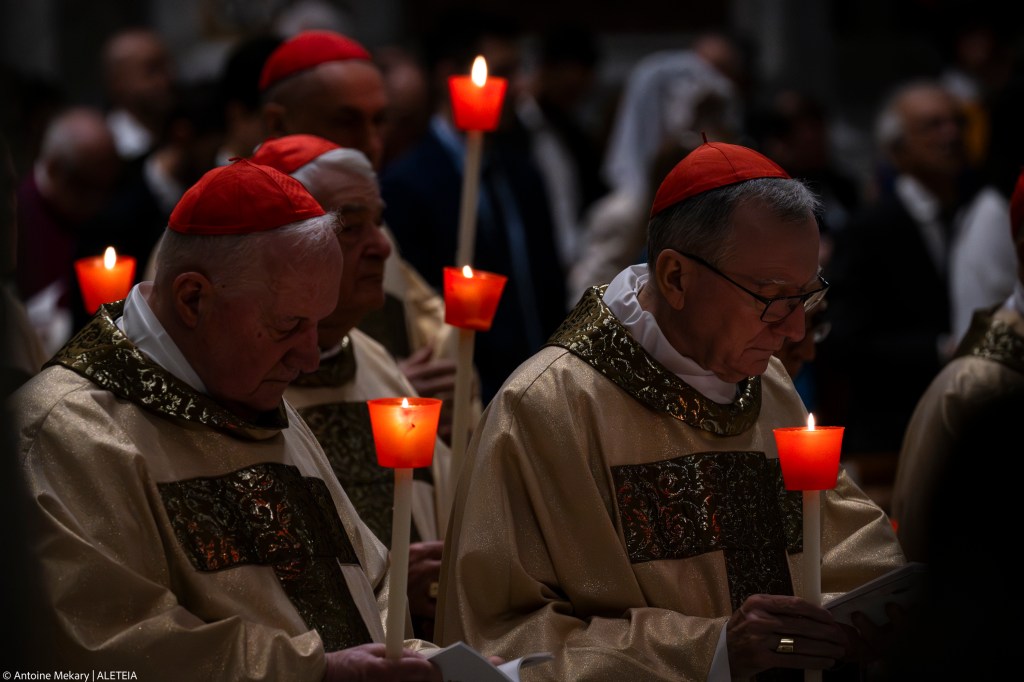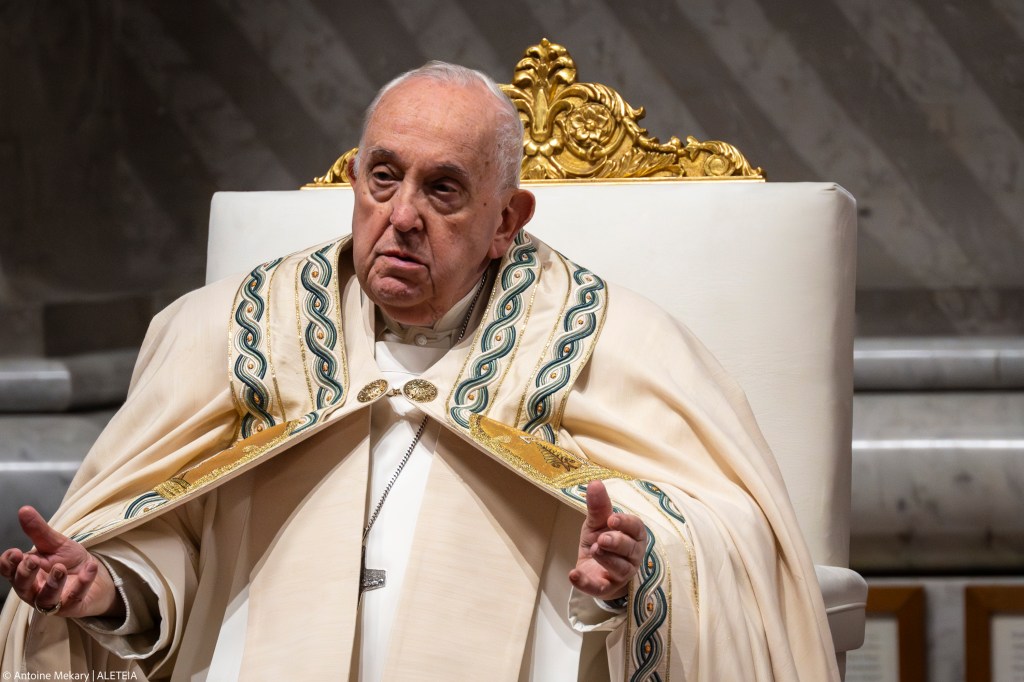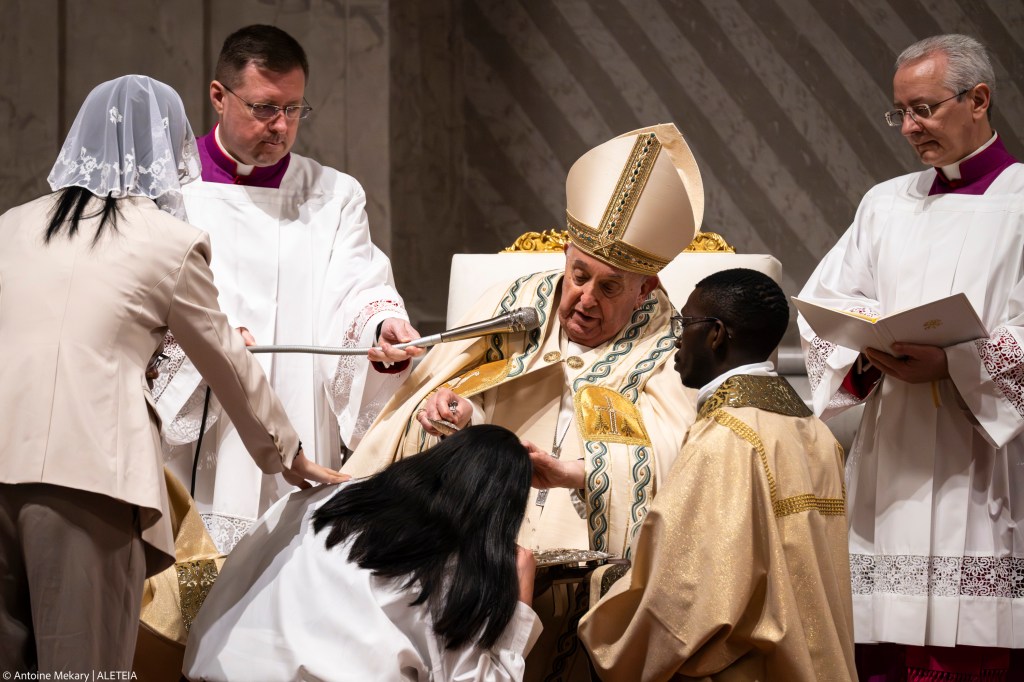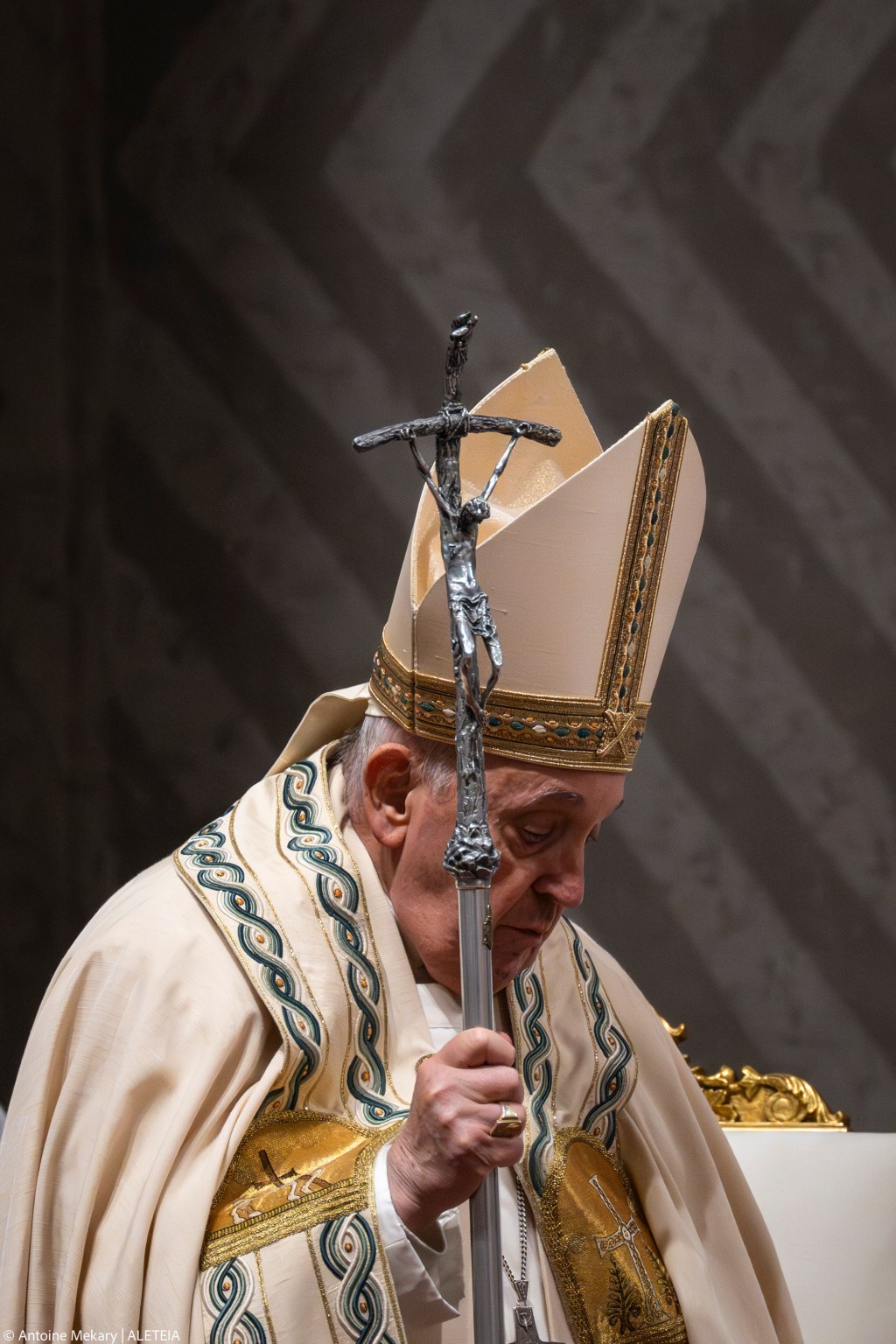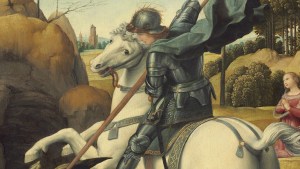Pope Francis celebrated the Easter Vigil Mass in St. Peter’s Basilica, inviting the faithful to “look up” to Jesus, and discover that the stone has already been rolled away.
After the homily, the assembly intoned the litany of the saints, before the Pope proceeded to the baptism of eight adults. Four of these catechumens were Italians, two others Koreans, and one Japanese and one Albanian.
The Pontiff, as has generally been the case since he started using a wheelchair, did not preside over the Eucharistic prayer. Cardinal Leonardo Sandri, vice-dean of the college of cardinals, replaced him at the Altar of Confession, currently surmounted by significant scaffolding due to the restoration work underway on Bernini’s baldacchino.
Here is a Vatican translation of Pope Francis’ homily.
~
The women go to the tomb at daybreak, yet they still feel the darkness of night. They continue to walk, yet their hearts remain at the foot of the cross. The tears of Good Friday are not yet dried; they are grief-stricken, overwhelmed by the sense that all has been said and done. A stone has sealed the fate of Jesus. They are concerned about that stone, for they wonder: “Who will roll away the stone for us from the entrance to the tomb?” (Mk 16:3). Yet once they arrive, they are taken aback when they see the amazing power of the Easter event: “When they looked up, they saw that the stone, which was very large, had already been rolled back” (Mk 16:4).
Dear brothers and sisters, let us stop and reflect on these two moments, which bring us to the unexpected joy of Easter. At first, the women anxiously wonder: Who will roll away the stone from the tomb? Then, at a second moment, looking up, they see that it had already been rolled back.
First, there is the question that troubles their grieving hearts: Who will roll away the stone from the tomb? That stone marked the end of Jesus’ story, now buried in the night of death. He, the life that came into the world, had been killed. He, who proclaimed the merciful love of the Father, had met with no mercy. He, who relieved sinners of the burden of their condemnation, had been condemned to the cross. The Prince of Peace, who freed a woman caught in adultery from a vicious stoning, now lay buried behind a great stone. That stone, an overwhelming obstacle, symbolized what the women felt in their hearts. It represented the end of their hopes, now dashed by the obscure and sorrowful mystery that put an end to their dreams.
Brothers and sisters, it can also be that way with us. There are times when we may feel that a great stone blocks the door of our hearts, stifling life, extinguishing hope, imprisoning us in the tomb of our fears and regrets, and standing in the way of joy and hope. We encounter such “tombstones” on our journey through life in all the experiences and situations that rob us of enthusiasm and of the strength to persevere. We encounter them at times of sorrow: in the emptiness left by the death of our loved ones; we encounter them in the failures and fears that hold us back from accomplishing the good we mean to do. We encounter them in all the forms of self-absorption that stifle our impulses to generosity and sincere love, in the rubber walls, the real rubber walls, of selfishness and indifference that hold us back in the effort to build more just and humane cities and societies; we encounter them in all our aspirations for peace that are shattered by cruel hatred and the brutality of war. When we experience these disappointments, do we also have the sensation that all these dreams are doomed to failure, and that we too should ask ourselves in anguish: “Who will roll away the stone from the tomb?”
Yet the same women who bore this darkness in their hearts tell us something quite extraordinary. When they looked up, they saw that the stone, which was very large, had already been rolled back. This is the Pasch of Christ, the revelation of God’s power: the victory of life over death, the triumph of light over darkness, the rebirth of hope amid the ruins of failure. It is the Lord, the God of the impossible, who rolled away the stone forever. Even now, he opens our hearts, so that hope may be born ever anew. We too, then, should “look up” to him.
The second moment: let us look up, then, to Jesus. After assuming our humanity, he descended into the depths of death and filled them with the power of his divine life, allowing an infinite ray of light to break through for each of us. Raised up by the Father in his, and our, flesh, in the power of the Holy Spirit, he turned a new page in the history of the human race. Henceforth, if we allow Jesus to take us by the hand, no experience of failure or sorrow, however painful, will have the last word on the meaning and destiny of our lives. Henceforth, if we allow ourselves to be raised up by the Risen Lord, no setback, no suffering, no death will be able to halt our progress towards the fullness of life. Henceforth, “we Christians proclaim that this history… has meaning, an all-embracing meaning… a meaning no longer tainted by absurdity and shadows… a meaning that we call God… All the waters of our transformation converge on him; they do not pour down into the depths of nothingness and absurdity… For his tomb is empty and the One who died has now been revealed as the Living One” (K. RAHNER, Wie heisst Auferstehung?).
Brothers and sisters, Jesus is our Pasch. He is the One who brings us from darkness into light, who is bound to us forever, who rescues us from the abyss of sin and death, and draws us into the radiant realm of forgiveness and eternal life. Brothers and sisters, let us look up to him! Let us welcome Jesus, the God of life, into our lives, and today once again say “yes” to him. Then no stone will block the way to our hearts, no tomb will suppress the joy of life, no failure will doom us to despair. Brothers and sisters, let us lift our eyes to him and ask that the power of his resurrection may roll away the heavy stones that weigh down our souls. Let us lift our eyes to him, the Risen Lord, and press forward in the certainty that, against the obscure backdrop of our failed hopes and our deaths, the eternal life that he came to bring is even now present in our midst.
Sister, brother, let your heart burst with jubilation on this night, this holy night! Together let us sing of Jesus’ resurrection: “Sing to him, everything sing to him: rivers and plains, deserts and mountains … Sing to the Lord of life, risen from the tomb, more brilliant than a thousand suns. All peoples beset by evil and plagued by injustice, all peoples displaced and devastated: on this holy night cast aside your songs of sadness and despair. The Man of Sorrows is no longer in prison: he has opened a breach in the wall; he is hastening to meet you. In the darkness, let an unexpected shout of joy resound: He is alive; he is risen! And you, my brothers and sisters, small and great … you who are weary of life, who feel unworthy to sing… let a new flame be kindled in your heart, let new vitality be heard in your voice. It is the Pasch of the Lord, brothers and sisters; it is the feast of the living” (J-Y. QUELLEC, Dieu face nord, Ottignies, 1998, 85-86).
